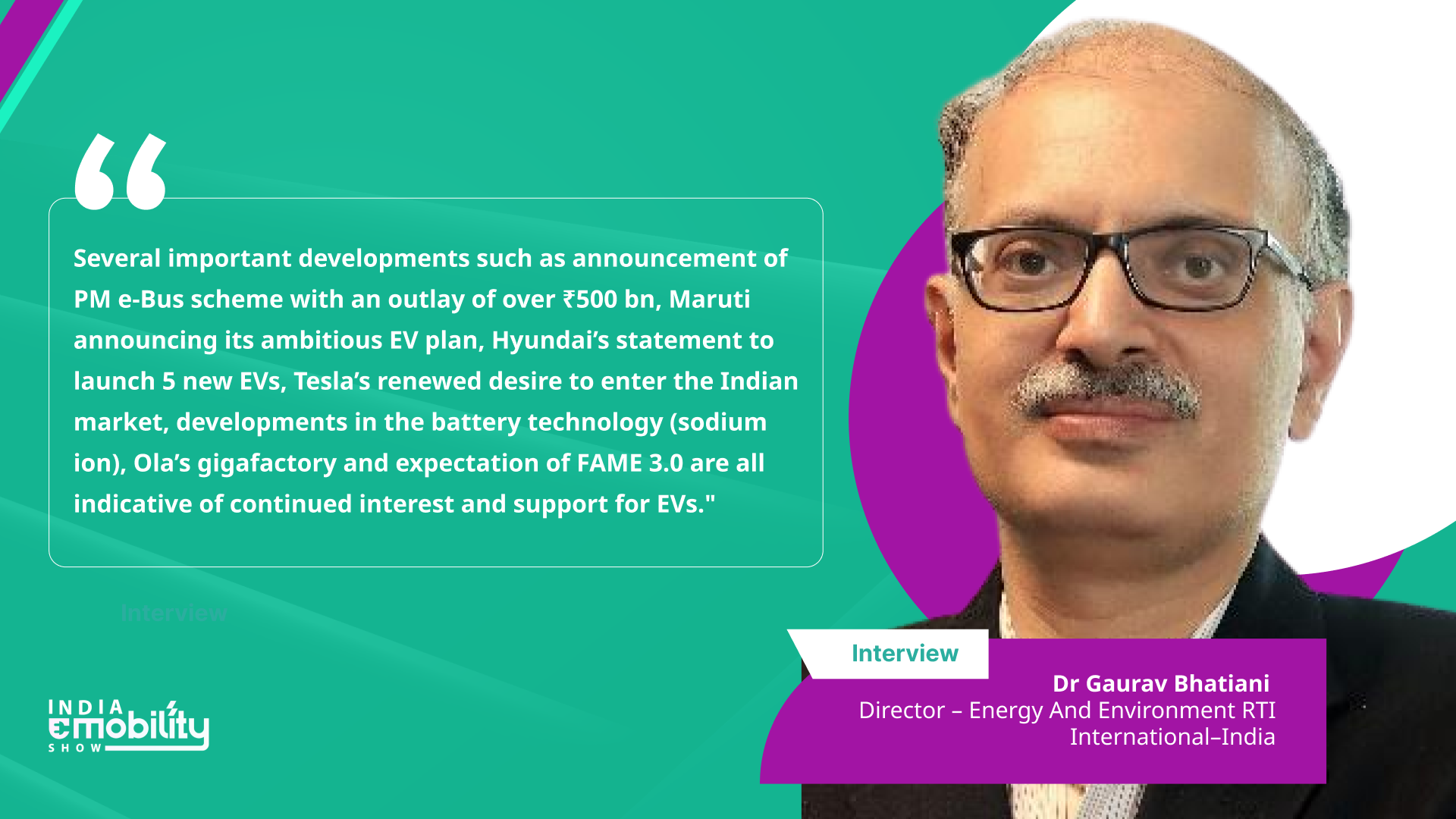Dr Gaurav Bhatiani, Director – Energy and Environment at RTI International, is a recognized expert in the energy and infrastructure sectors with over 27 years of experience. He has advised governments, public utilities, private-sector companies, and regulatory bodies on a wide range of issues related to power, renewable energy, energy efficiency, and infrastructure finance. He is a member of several professional organizations and has authored several articles and research papers on the topics of energy and environment.
In this Q&A Session Dr Bhatiani shared his insights on the latest trends and notable developments in the electric vehicle industry in India. He also discussed the significance of transitioning the automobile sector to EVs in India, the role of research institutes in advancing EV adoption, and the economic benefits of widespread electrification of automobiles.
Let us delve more into our engaging Q&A session with Dr Gaurav Bhatiani.
#IES: What are the latest trends and notable developments in the electric vehicle industry in India?
Dr Gaurav Bhatiani: The overall trend is very positive and constructive. Several important developments such as announcement of PM e-Bus scheme with an outlay of over ₹500 bn, Maruti announcing its ambitious EV plan, Hyundai’s statement to launch 5 new EVs, Tesla’s renewed desire to enter the Indian market, developments in the battery technology (sodium ion), Ola’s gigafactory and expectation of FAME 3.0 are all indicative of continued interest and support for EVs.
It is expected that the market will continue to grow rapidly driven by supportive policies and improvements in the product offerings.
#IES: Given the increasing concerns about climate change, could you elaborate on the significance of transitioning the automobile sector to electric vehicles in India?
Dr Gaurav Bhatiani: India is growing rapidly. We are also urbanizing at a rapid pace. Therefore, the demand for urban transport is expected to increase significantly. Globally, as well as domestically, transport is a significant contributor to emissions, both GHG and local pollutants.
There is a continuing debate about the climate benefits of EVs. Notwithstanding, EVs can be a win-win for India.
First, they provide an opportunity to dramatically improve the air quality in our cities. Second, because India has an ambitious plan for renewable energy, EVs will enable a reduction of the carbon footprint of the transport sector. Further, well-designed policies and regulations can enable batteries in EVs to complement intermittency of renewables. Third, the EV transition is an opportunity for India to focus on developing a robust public transport with e-buses as the fulcrum. Efficient mobility will improve lives of youth and underprivileged, by expanding access to new and additional opportunities to markets, education, and jobs.
EVs can also enable channelizing energy and entrepreneurship of the youth to achieve climate goals. By demonstrating concrete action at individual level, EVs support wider communication and participation of masses in India’s net-zero journey.
#IES: How crucial is the role of research institutes in advancing the adoption of electric vehicles for achieving sustainable transportation goals?
Dr Gaurav Bhatiani: Research institutions will play a crucial role in this transition. Since EVs are based on new technologies, there is an understandable lack of knowledge and reluctance to adopt them.
Independent research enables fair evaluation and unbiased opinion, thereby building trust and confidence of stakeholders and consumers.
Further, research institutions work closely with Government authorities to design policies, frame regulations, and develop business models for accelerating EV adoption.
#IES: Besides the evident environmental advantages, could you outline the economic benefits that arise from the widespread electrification of automobiles?
Dr Gaurav Bhatiani: I have already mentioned some of these i.e., employment opportunities, expanding access to markets and education.
Beyond these, EVs present a potential for India to move up the manufacturing value chain through component and assembly manufacturing. Given the size of the local market and the global EV transition underway, EVs can create a momentum for domestic production of electronic parts such as integrated circuits, chips, and cells. These components are used in multiple applications such as mobiles, laptops, and consumer appliances, amongst others. Therefore, local manufacturing can provide high quality jobs on one hand and make these products more affordable and accessible on the other.
#IES: In what ways do events like the India eMobility Show contribute to the advancement and growth of electric mobility initiatives?
Dr Gaurav Bhatiani: I believe India eMobility Show provides an excellent platform for demonstrating progress made, enables exchange of ideas, and provides opportunity for networking amongst stakeholders.Such events go a long way to enhance the spirit of collaboration and healthy competition in the market.
I wish the event all success and hope it will spur positive action across the industry.
Book Your Complimentary Free Full-Access Delegate Pass Here

